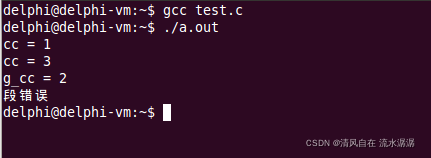C语言const与volatile
清风自在 流水潺潺 人气:0一、const 只读变量
- const 修饰的变量是只读的,本质还是变量
- const 修饰的局部变量在栈上分配空间
- const 修饰的全局变量在全局数据区分配空间
- const 只在编译期有用,在运行期无用
const 修饰的变量不是真的常量,它只是告诉编译器该变量不能出现在赋值符号的左边。
二、const 全局变量的分歧
在现代C语言编译器中,修改 const 全局变量将导致程序崩溃。
注意:标准C语言编译器不会将 cons t修饰的全局变量存储于只读存储区中,而是存储于可修改的全局数据区,其值依然可以改变。
下面看一段代码:
#include <stdio.h>
const int g_cc = 2;
int main()
{
const int cc = 1;
int* p = (int*)&cc;
printf("cc = %d\n", cc);
*p = 3;
printf("cc = %d\n", cc);
p = (int*)&g_cc;
printf("g_cc = %d\n", g_cc);
*p = 4;
printf("g_cc = %d\n", g_cc);
return 0;
}下面为输出结果:

上面代码说明 const 修饰的局部变量可以通过指针修改里面的值,但是 const 修饰的全局变量则不能通过指针来修改里面的值,会发生段错误。
三、const 的本质
- C 语言中的 const 使得变量具有只读属性
- 现代 C 编译器中的 const 将具有全局生命周期的变量存储于只读存储区(staic 修饰的变量也有全局生命周期,所以用 const 修饰后也存储于只读存储区)
- const 不能定义真正意义上的常量
下面看一段 const 本质分析的代码:
#include <stdio.h>
const int g_array[5] = {0};
void modify(int* p, int v)
{
*p = v;
}
int main()
{
int const i = 0;
const static int j = 0;
int const array[5] = {0};
modify((int*)&i, 1); // ok
//modify((int*)&j, 2); // error
modify((int*)&array[0], 3); // ok
//modify((int*)&g_array[0], 4); // error
printf("i = %d\n", i);
printf("j = %d\n", j);
printf("array[0] = %d\n", array[0]);
printf("g_array[0] = %d\n", g_array[0]);
return 0;
}下面为输出结果:

如果把注释去掉,就会报段错误:

这就对应上面说的,如果修改 const 修饰的全局生命周期的变量,程序就会发生崩溃。
四、const 修饰函数参数和返回值
- const 修饰函数参数表示在函数体内不希望改变参数的值
- const 修饰函数返回值表示返回值不可改变,多用于返回指针的情形
小贴士:C 语言中的字符串字面量存储于只读存储区中,在程序中需要使用 const char* 指针。
下面看一段const 修饰函数参数与返回值的代码吧:
#include <stdio.h>
const char* f(const int i)
{
//i = 5;
return "Autumn Ze";
}
int main()
{
const char* pc = f(0);
printf("%s\n", pc);
//pc[6] = '_';
//printf("%s\n", pc);
return 0;
}下面为输出结果:

如果把下面的语句去掉注释
//pc[6] = '_';
//printf("%s\n", pc);运行程序就会报错,不能尝试去修改只读变量:

五、volatile 解析
- volatile 可理解为“编译器警告指示字”
- volatile 告诉编译器必须每次去内存中取变量值
- volatile 主要修饰可能被多个线程访问的变量
- volatile 也可以修饰可能被未知因数更改的变量
如下:

六、小结
- const 使得变量具有只读属性
- const 不能定义真正意义上的常量
- const 将具有全局生命期的变量存储于只读存储区
- volatile 强制编译器减少优化,必须每次从内存中取值

加载全部内容